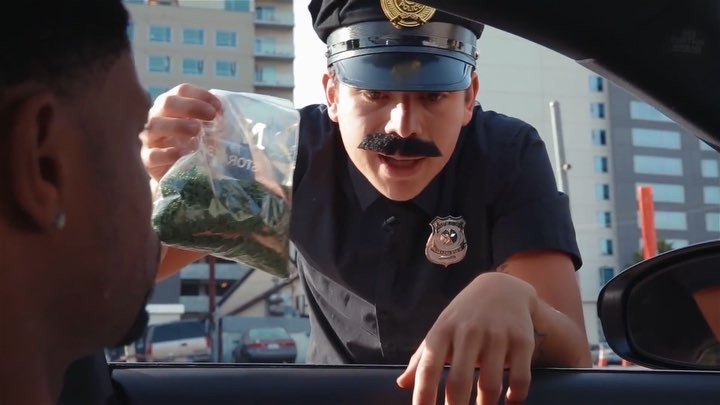Smoker to Catch a Smoker: Stories of Police Officers Who Love Marijuana
“A victimless crime.” This simple phrase clearly explains why many marijuana users don’t understand why the police pursue their hobby when it doesn’t harm anyone, unlike some other crimes. Over the past 50 years, more and more people have come to view marijuana this way, demanding its legalization. These changing attitudes have also affected those tasked with fighting its spread.
Many police officers are aware of legal marijuana markets and don’t believe they harm society. In fact, some of these “enlightened” law enforcement officers now understand that marijuana isn’t addictive and has many medical uses. It’s unlikely such officers would arrest someone found with a few grams of marijuana “for a sick grandmother” or simply to calm their nerves.
On the other hand, there are law enforcement officers who are engaged in a never-ending battle with the black market for illegal substances, where daily deals often far exceed their annual salaries. As a result, some police officers have started their own marijuana businesses, selling confiscated marijuana or cultivation equipment, such as grow lights, directly from the evidence room. In recent years, stories like these have increasingly made headlines.
Recently, the American website stopthedrugwar.org compiled an impressive list of cases involving particularly enterprising police officers who profited from prohibition. The list includes examples from law enforcement agencies around the world, especially in European countries, where it seems more and more police are getting involved in the very activities they are supposed to fight.
“Professional Plantation” in Basel
In Basel, Switzerland, where authorities have unofficially stopped fighting marijuana, a married couple of police officers was arrested in February after 90 marijuana plants were found on their property. Their colleagues described it in reports as a “professional marijuana plantation.” They are suspected of selling their harvest, as local police believe that amount is far too much for personal use.
The Nijmegen Incident
In 2012, Dutch police discovered the body of Jan Petter, the chief of police in the town of South Gelderland, in Nijmegen. Nearby were the bodies of his ex-girlfriend and her new partner. At the crime scene, police also found a marijuana plantation. A second plantation was discovered in a house owned by the deceased couple in Millingen aan de Rijn, which they had rented out to another police officer from Gelderland.
Suspicious Colleague from Braunschweig
In February 2014, in Braunschweig, Germany, police arrested a man with 40 grams of marijuana as he tried to sell it. Further investigation revealed he was cultivating 60 marijuana plants using professional equipment—and that he was a police officer. Only after a direct inquiry from a local newspaper did the federal prosecutor inform the public that the suspect was a law enforcement officer who had long worked in the narcotics division and was conducting a special operation at the time of his arrest.
Arrest in Kempten
In Bavaria, known for its strict marijuana laws, the head of the local narcotics police department in Kempten was arrested. He was sentenced to six and a half years in prison for storing two kilos of cocaine in his personal locker and for domestic violence. At the same time in Bavaria, a technical hemp grower received an eight-month sentence because police mistook his 800 industrial hemp plants for recreational marijuana.
Smuggling in Thuringia
At the end of 2014, two federal police officers in Thuringia, Germany, were arrested for smuggling methamphetamine into the country. The men are suspected of repeatedly bringing the illegal drug into Germany for personal use. They admitted to being “moderate” users and said that, in addition to methamphetamine, they sometimes used and transported marijuana across the border.
Drug Testing? No, Thanks!
These cases are just the most scandalous and high-profile incidents—the full list is much longer. Lesser cases involve police officers caught using confiscated marijuana for self-medication or those involved in small-scale underground sales and smuggling. In Germany, crimes committed by police officers are strictly documented, detailing the officer’s misconduct. For example, in Bavaria, all 23 cases of police officers caught with marijuana in 2013 were fully documented and made public. In other parts of Germany, however, such cases are often hushed up and handled internally.
Rumor has it that the widespread use and sale of marijuana by German police is the reason the federal police union actively opposes any government measures to introduce mandatory drug testing for police officers.
Criminals or Victims?
We shouldn’t rush to criticize law enforcement officers for this behavior. Instead of pointing fingers, we should understand that their crimes and misconduct are a direct result of existing laws that criminalize marijuana. A police officer caught using or selling marijuana is just as much an innocent victim of the Global War on Drugs as anyone else. They, too, will go to prison for a victimless crime, losing their jobs and pensions.
As Belgian professor Tom DeCorte, a criminologist and criminal psychologist at Ghent University, puts it: “The current situation with criminalization, from the police perspective, is like cleaning up after a burst pipe—no matter how much you mop up, the water keeps coming.”
Perhaps it’s time for authorities to realize that it’s better to fix the “leak” of criminalization itself, rather than desperately trying to fight the inevitable consequences, such as rising crime and corruption.



